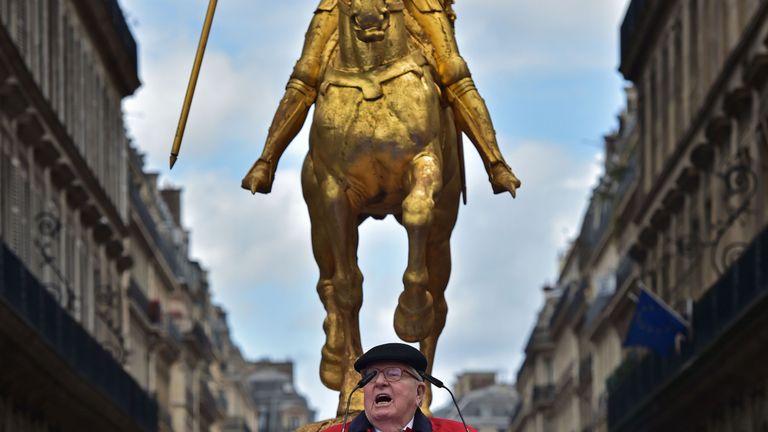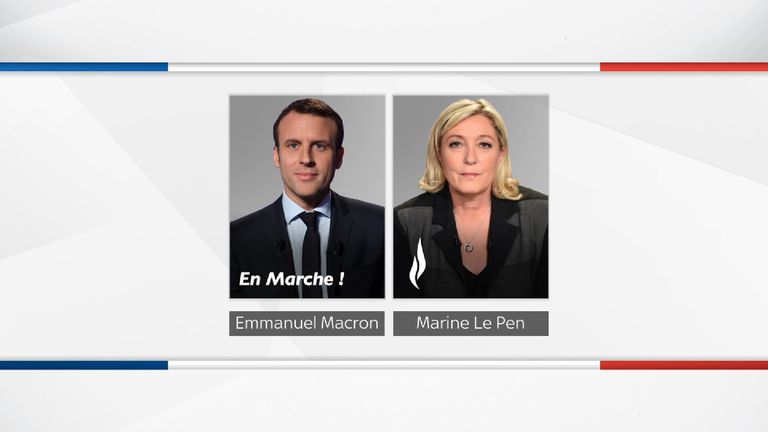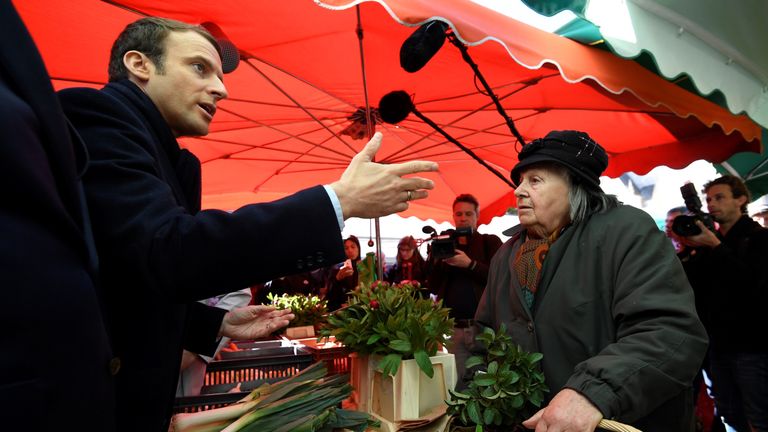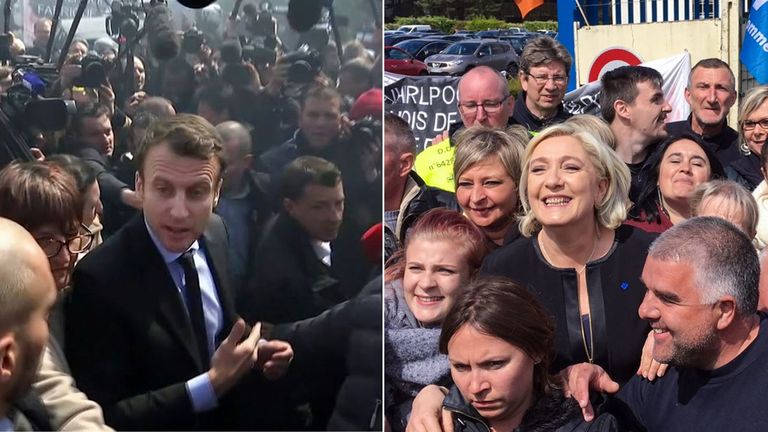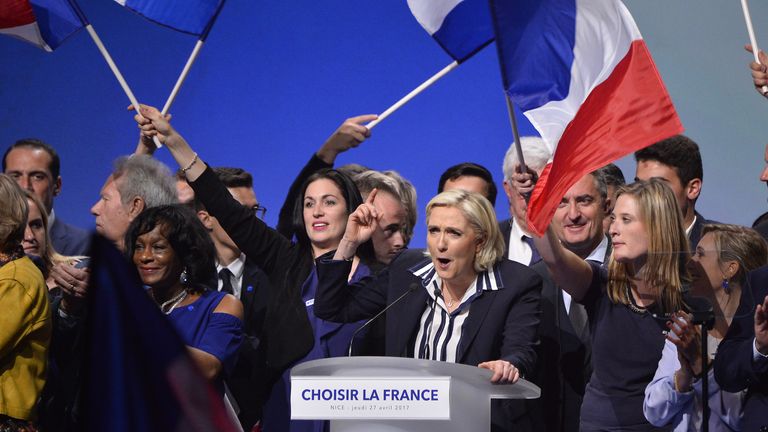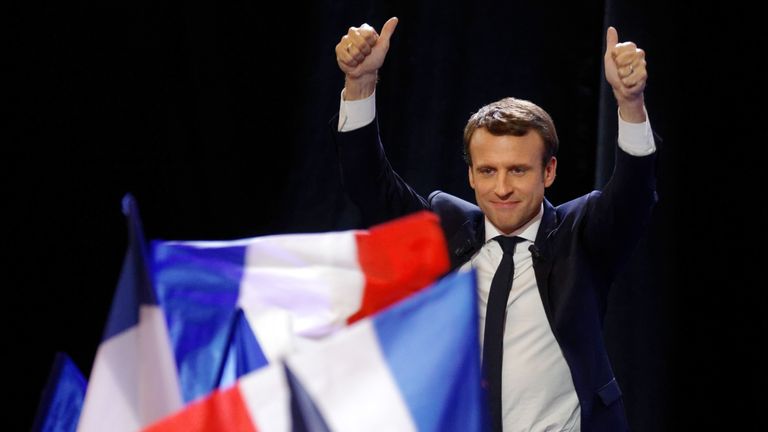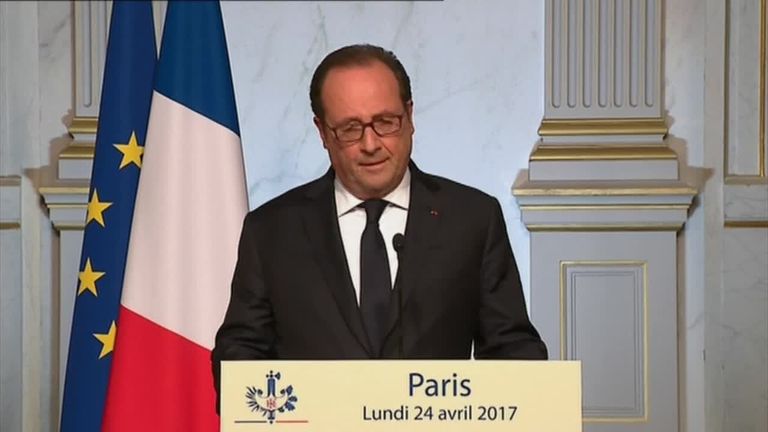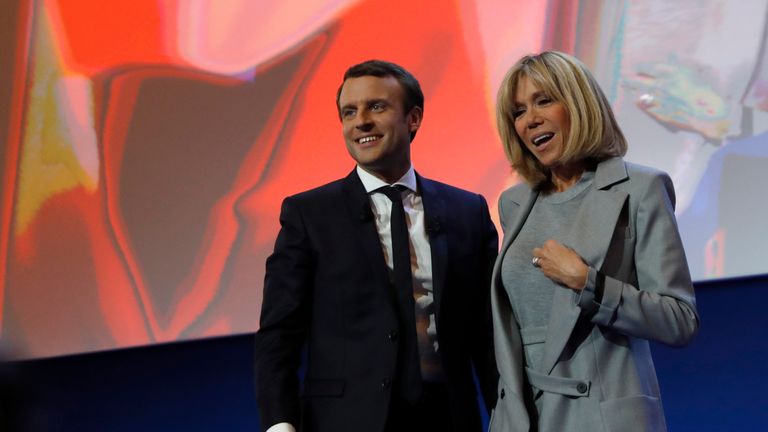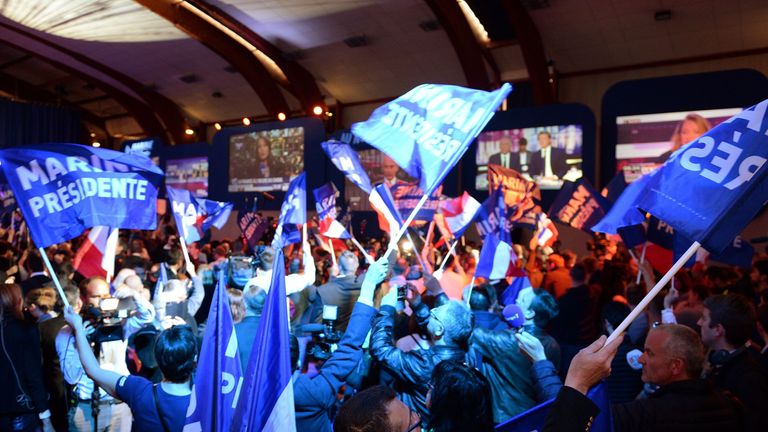French election: Has Le Pen just had her Melania moment?
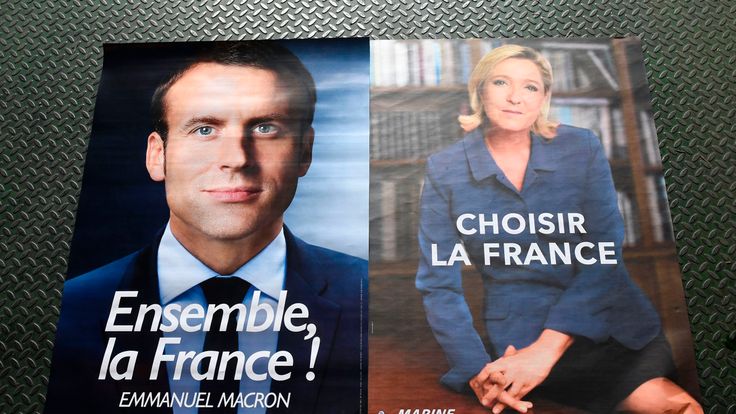
Tuesday 2 May 2017 08:49, UK
By Mark Stone, Europe Correspondent
France will pick its new president on 7 May - and it has to choose between and .
In the run-up to election day, Sky News Europe Correspondent Mark Stone will be sharing his thoughts about how the race is progressing.
Has Marine Le Pen just had her Melania moment? Did she 'borrow' sections of her final mass rally speech from a speech made by a rival a few weeks ago?
The video comparison put together by Ridicule TV - which prides itself on ridiculing French politics - doesn't look good.
Back on 15 April, the now defeated first round conservative candidate Francois Fillon delivered a speech in Puy-en-Velay. In it he mentioned France's borders and talked about a third "French way" for the future.
"The path of culture, doubt, discussion, compromise, dialogue; the path of balance, the freedom of individuals and peoples," Mr Fillon said.
"I sincerely believe that this path, the French way, remains a hope for the world of the 21st century."
Yesterday at her May Day Villepinte rally, Ms Le Pen talked of an "alternative route".
"This way is that of culture, that of doubt, discussion, compromise, the way to balance the freedom of individuals and peoples. I sincerely believe that this answer and this answer alone is profoundly French," she said.
Both Fillon and Le Pen then used the same quote by novalist André Malraux: "La France n'est la France que si elle porte une part de l'esperance du monde." (France is France only if it carries a part of the hope of the world)
In his speech, Mr Fillon also quoted from First World War Prime Minister Georges Clemenceau. Ms Le Pen did the same.
Responding overnight to the allegations, Ms Le Pen's deputy, Florian Philippot, claimed it was "a nod to a short passage in a speech about France" on the part of "a candidate that shows she is not sectarian".
In the French media this morning there is a suggestion that the similarities are the result of both candidates using the same speechwriter.
French politician Paul-Marie Couteaux was once an ally of Marine Le Pen. But during this presidential campaign he had been seen working for Francois Fillon.
Was Ms Le Pen using lines once given to her by her old ally Mr Couteaux who had since given the same words to Mr Fillon?
Whatever happened, it's embarrassing and potentially damaging with less than a week to go until the election.
With just a week to go, both candidates seem to be tweaking their rhetoric, shifting their stance in last minute attempts to lure more voters.
Marine Le Pen is still calling for a Frexit and despises the euro single currency but she's tacked just a little away from her far-right stance over the past few days.
There's just a little less mention of the EU and the euro. She knows that many elderly voters worry about their savings in the event of a Frexit and return to the franc.
And she has appointed Nicolas Dupont-Aignan as her would-be Prime Minister. Mr Dupont-Aignan, who is far to the right of centre but not 'far-right', was sixth in the first round contest, securing 4.7% of the vote.
His party Debout La France (Stand Up France) is an offshoot of the conservative right. The alliance will be seen by some right-wing voters as attractive.
He certainly seems to have had an epiphany. Three years ago, he tweeted "Do you want to entrust the Le Pen family with the keys to the country?"
Today he just told a crowd of thousands: "On Sunday the French will need to choose their destiny. Never before has a second round been so pivotal for our future. To vote for Macron would be to put France under the power of money. I chose France. I chose Marine."
For his part, we've seen Emmanuel Macron tacking a little, too.
He is passionately pro-Europe but has been going out of his way over the past few days in telling the TV cameras that the EU needs reform; not a Frexit, but significant re-moulding.
He knows that nearly 50% of voters chose anti-EU anti-establishment parties in the first round and he needs to be seen to agree with them that the EU in its current form doesn't work.
The latest polls show that Mr Macron's lead has slipped six points since just before the first round.
I write this as I listen to Marine Le Pen's final major rally. She's attacking her opponent with trademark fire and anger. He is, she says, just a puppet of the outgoing Socialist Francois Hollande.
"Emmanuel Hollande," she shouts.
"Hollande is in his ear every day, giving him advice: this president who failed the country; the president who left through the door but is trying to come back in through the window."
This is her key attack-line and potentially Mr Macron's Achilles Heel - the idea that he is in the pocket of Hollande, that he represents a continuation of the disastrous policies of the incumbent socialists.
"We need to gather together. Keep momentum up," Ms Le Pen's campaign manager tells me.
"Macron's project is destructive and submissive to Europe. It's not in France's interests."
The polls suggest a wide majority of French voters disagree. Mr Macron is .
The candidates' ability to lure voters one way or the other over the next seven days will set the country's direction. The two choices could not be more opposing.
One of the most remarkable aspects of round one of the French election was the fact that the pollsters got it right.
We'd all given up on the accuracy of polls after Brexit and Trump, but for round one of the presidential election they were right in calling it for Mr Macron, followed by Ms Le Pen and they got the share almost bang on too.
This week the same polls have been revealing some fascinating data.
In trying to predict the direction of round two, the big question has been which way would all those who didn't vote for either Macron or Le Pen vote. Remember, half of voters didn't choose either of them.
Nearly 40% of first round voters chose the candidates who came third and fourth - Jean-Luc Mélenchon and Francois Fillon. How many of them will stay at home next Sunday? How many will vote and which way?
Political logic (to the extent that politics is logical these days) would suggest that a minority of those who voted for centre-right candidate Francois Fillon would turn hard-right and vote Le Pen.
The rest would curve round to the centre ground and vote Macron.
On the left, those who voted for Socialist Benoit Hamon would choose Macron. But what about supporters of far-left candidates Jean-Luc Mélenchon? He pointedly didn't endorse Mr Macron.
The week's polls suggest both candidates face significant challenges in attempting to lure voters.
According to OpinionWay, 45% of those who voted for far-left candidate Mélenchon will abstain rather than vote for Mr Macron (or Ms Le Pen).
Only 40% will vote vote for Mr Macron - that represents a drop in Mélenchon voters' support for Macron of 15% since Monday.
Mr Macron's at a closing tumble dryer factory may not have helped.
Intriguingly, 15% of those polled who voted for far-left Mélenchon said they would vote for far-right Le Pen in the second round.
That's dropped from 22% at the beginning of the week but still represents interesting political calculations - shifting from far-left to far-right.
Both Mr Mélenchon and Ms Le Pen cast themselves as anti-establishment and anti-EU. In fact, with the exception of Ms Le Pen's hard line on immigration, there are many parallels which explain the overlap in support.
As for Fillon voters, as you'd imagine, most are shifting left to Mr Macron - a steady 43% through the week said they'd vote for the centrist.
Some 29% of polled Fillon voters said they'd support Ms Le Pen and 28% said they'd abstain.
Those who voted for socialist candidate Benoit Hamon (and there weren't many) overwhelmingly said they'd vote for Mr Macon this time - 68%.
The rest - 29% - said they'd abstain and a curious 3% said they'd shift from establishment Socialist Hamon to anti-establishment far-right Ms Le Pen.
We expected the abstention rate to be quite high in round one. Anecdotally, I met many people who said they were thinking of not voting. Yet many turned out - almost the same as the last election in 2012.
For the second round though, the abstention rate is set to be higher and that will benefit Marine Le Pen.
It's been quite a week for both candidates as they get used to only having one opponent, not ten.
Mr Macron's began with an ill-advised celebration party in a swanky Paris brasserie (hardly "man-of-the-people" his critics cried) and an awkward confrontation with staff at a tumble dryer factory in his home town.
Ms Le Pen turned up at the factory in what Mr Macron said was a publicity stunt. A wholly successful one it seems: while he was confronted by angry Whirlpool staff, whose factory is set to close, she was posing for selfies with them on a nearby picket line.
The French media seems split on whether Mr Macron held his own in an impromptu debate with the workers or whether the whole thing was very awkward.
At the beginning of the week Ms Le Pen stepped down as the leader of her party the Front National - a calculated move to cast her as the leader-in-waiting of all French people, not just those on the far right of politics.
But it backfired when the man she chose to replace her lasted a matter of days before historic racist remarks caught up with him.
Jean-Francois Jalkh is accused of denying the Holocaust in remarks made 17 years ago ("still a racist party" cry the critics).
Mr Jalkh contests the comments but has stepped down anyway.
An own-goal for Le Pen.
Speaking of goals, (and missing) in the obligatory politician-plays-football-in-suit photo op.
There've not been any huge moments or revelations yet though to throw the election off course.
Macron is still the firm favourite to win.
Put aside their politics for a moment, let's think selfishly. Who would be better for Brexit? President Le Pen or President Macron?
On the face of it you might think President Le Pen would Britain's better bet. After all she wants to follow Britain's lead with a Frexit.
Using the same playbook deployed by David Cameron before Brexit, she would enter into a series of renegotiations on France's relationship with the EU.
She'd be much more demanding than Cameron was, though. Brussels wouldn't have it. She'd fail, call a referendum and a Frexit could follow.
Brussels would gamble that France isn't like the UK; they'd never vote to leave. They're probably right.
But the whole affair would only encourage Brussels to close ranks; to continue with its paranoia and frustration at its members' euroscepticism. In that climate a good Brexit deal would not be likely.
President Macron is the much more plausible outcome for the election. He's not a federalist but is very much a europhile.
He didn't really sound like he'd be much help to Britain when he brazenly stood on the steps of Number 10 a few weeks ago and called for a British city .
But his victory would re-embolden a wounded EU; the perception would be that 2017 is turning out to be a good year - Geert Wilders didn't win in The Netherlands, Le Pen would have lost in France. Germany's far-right AfD is dead in the water.
In that context, there'd be less need for the EU to be seen to be hard on Britain to deter others from leaving the club too.
The Brexit mood emanating from Brussels would be more positive. The UK needs that.
Within the parameters of a hugely unpredictable election it was the most predictable result: a Macron/Le Pen run-off; the centrist independent versus the far-right nationalist.
The polls have consistently put those two candidates in the lead - it turns out they were pretty much spot on.
But with the other two frontrunners - Francois Fillon and Jean-Luc Melenchon - also within the margin of error and the polls inability to predict Trump and Brexit, there was more than an inkling that anything could happen.
Also predictable was the fact that Mr Fillon, the centre-right conservative and Benoit Hamon, the centre-left Socialist, threw their weight behind Mr Macron.
They both endorsed him and encouraged their supporters to do the same.
Mr Melenchon interestingly did not. He said he didn't have the mandate to endorse either Mr Macron or Ms Le Pen.
So what is the most predictable course in the two weeks between now and the run off on 7 May?
The polls suggest Mr Macron will beat Ms Le Pen by a very comfortable margin. Perhaps 60% to 40%.
Ms Le Pen has an extremely solid support base. The question is, has it hit its ceiling already? How many more people are out there who didn't vote for her in the first round but will do in the second?
Political logic would suggest that the only people who'd consider voting for her in the second round are right-wing Fillon supporters who can't stomach centrist Mr Macron.
Within the spectrum of the centre-right, Mr Fillon is well to the right. He nudged even further in the course of the campaign to attract Le Pen supporters.
And so some of his support base will probably edge further right to Ms Le Pen. They'll be the ones for whom Mr Macron is simply a reincarnation of the disastrous Francois Hollande.
Mr Macron was once the Socialist's economy minister. It was Mr Hollande who hired him to advise on economic policy before making him a minister. The economy has flatlined under the Socialists.
Ms Le Pen wasted no time in telling her victory party that Mr Macron was simply a continuation of the deeply unpopular status quo. We will hear that repeatedly over the next fortnight. She'll pick apart his pro-immigration policies and his admiration for the EU and globalisation.
As for Mr Macron; political logic would suggest that he'll pick up the votes of all those who supported Socialist candidate Mr Hamon (6%), all of those who supported far-left candidate Mr Melenchon (19.5%).
But many of them may decide they'd rather not vote than vote for Mr Macron. The abstention rate in round two will be interesting.
If all that logic stands up, then Mr Macron will easily win the run-off and become the next French president.
It was interesting and very unusual that both the President of the European Commission and the EU Foreign Policy chief congratulated Mr Macron on his first round victory via twitter.
The EU usually doesn't involve itself in national elections. But in this case there is no question about who they want to win - their future rests on a Macron victory.





